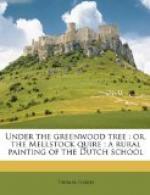Reuben made a point of fixing this sentence in the vicar’s mind by gazing hard at him at the conclusion of it, and then out of the window.
Mr. Maybold and old William looked in the same direction, apparently under the impression that the things’ faces alluded to were there visible.
“What I have been thinking”—the tranter implied by this use of the past tense that he was hardly so discourteous as to be positively thinking it then—“is that the quire ought to be gie’d a little time, and not done away wi’ till Christmas, as a fair thing between man and man. And, Mr. Mayble, I hope you’ll excuse my common way?”
“I will, I will. Till Christmas,” the vicar murmured, stretching the two words to a great length, as if the distance to Christmas might be measured in that way. “Well, I want you all to understand that I have no personal fault to find, and that I don’t wish to change the church music by forcible means, or in a way which should hurt the feelings of any parishioners. Why I have at last spoken definitely on the subject is that a player has been brought under—I may say pressed upon—my notice several times by one of the churchwardens. And as the organ I brought with me is here waiting” (pointing to a cabinet-organ standing in the study), “there is no reason for longer delay.”
“We made a mistake I suppose then, sir? But we understood the young woman didn’t want to play particularly?” The tranter arranged his countenance to signify that he did not want to be inquisitive in the least.
“No, nor did she. Nor did I definitely wish her to just yet; for your playing is very good. But, as I said, one of the churchwardens has been so anxious for a change, that, as matters stand, I couldn’t consistently refuse my consent.”
Now for some reason or other, the vicar at this point seemed to have an idea that he had prevaricated; and as an honest vicar, it was a thing he determined not to do. He corrected himself, blushing as he did so, though why he should blush was not known to Reuben.
“Understand me rightly,” he said: “the church-warden proposed it to me, but I had thought myself of getting—Miss Day to play.”
“Which churchwarden might that be who proposed her, sir?—excusing my common way.” The tranter intimated by his tone that, so far from being inquisitive, he did not even wish to ask a single question.
“Mr. Shiner, I believe.”
“Clk, my sonny!—beg your pardon, sir, that’s only a form of words of mine, and slipped out accidental—he nourishes enmity against us for some reason or another; perhaps because we played rather hard upon en Christmas night. Anyhow ’tis certain sure that Mr. Shiner’s real love for music of a particular kind isn’t his reason. He’ve no more ear than that chair. But let that be.”
“I don’t think you should conclude that, because Mr. Shiner wants a different music, he has any ill-feeling for you. I myself, I must own, prefer organ-music to any other. I consider it most proper, and feel justified in endeavouring to introduce it; but then, although other music is better, I don’t say yours is not good.”




